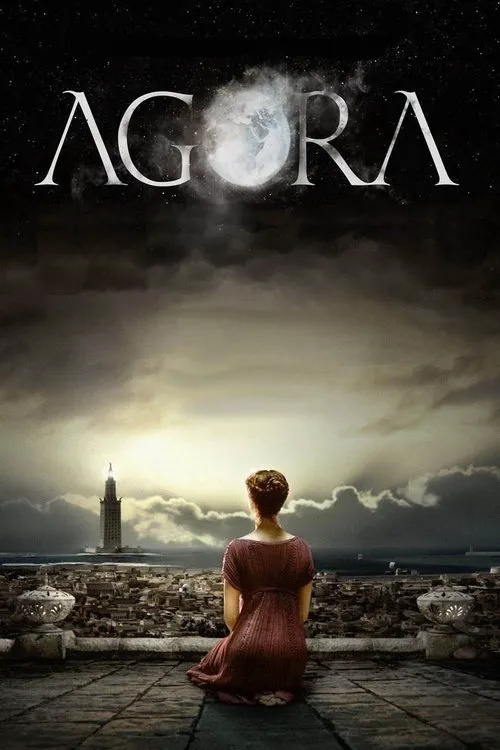Agora

Plot
Agora, a historical drama directed by Alejandro Amenábar, unfolds as a sweeping narrative that delves into the world of ancient Alexandria during the 4th century AD. The film revolves around Hypatia, one of the most enigmatic figures of the Hellenistic era - a brilliant philosopher, mathematician, and astronomer, renowned for her intellect and wisdom. As a representative of the old Pagan world, Hypatia finds herself entwined with the rising tide of Christianity, a movement that would forever alter the social fabric of Roman Egypt. At the heart of the narrative lies Davus, Hypatia's loyal and devoted slave. His life is one of unrelenting drudgery, tasked with serving his mistress, the great philosopher. Yet, Davus dreams of a different existence, one where freedom's weightless spirit rests upon his shoulders. To achieve this liberation, he finds himself torn between two conflicting worlds - the philosophical Paganism of his mistress, which emphasizes reason and intellectual curiosity, and the growing Christian movement, which promises a future of spiritual redemption and, in exchange, freedom. Davus's journey commences as a simple slave, but it rapidly transcends the boundaries of servitude. His intellectual curiosity is piqued as he observes Hypatia teaching the principles of mathematics and philosophy to a group of young scholars. He develops an affinity for the intellectual pursuits of his mistress, learning the art of astrology and even demonstrating an unquenchable thirst for knowledge. However, amidst these newfound interests, Davus also begins to explore the Christian faith, finding comfort in its promise of eternal salvation. This internal conflict sets the stage for a poignant and complex exploration of spirituality and intellectualism. As Hypatia delves deeper into her mathematical theories and celestial observations, she finds herself at the center of a maelstrom. The growing discontent among the Christian sects, who increasingly view her as a hindrance to their cause, heightens the tension. Accusations of her being a 'weaver of sorcery' fly freely, and soon, her lectures at the Library of Alexandria become the subject of heated discussions among the local populace. In a parallel narrative, the character of Lucius, a young Christian, emerges. As a zealous advocate for the Christian faith, Lucius fervently believes that Hypatia's Pagan teachings lead souls down a path of eternal damnation. The fervor in his eyes betrays a conviction that is unwavering and unshakeable, drawing Davus into the world of Christianity with an all-consuming intensity. The film skillfully captures the intricate dynamics between these characters, as Hypatia's dedication to her intellectual pursuits clashes with the escalating fervor of the Christian sects. Against this backdrop, Davus finds himself increasingly conflicted, torn between his loyalty to his mistress and the promise of freedom offered by the rising tide of Christianity. One pivotal sequence, showcasing Hypatia lecturing before a gathering of scholars at the Library, serves to underscore her stature as a revered intellectual. However, it also foreshadows the increasing danger she faces as the Christian influence grows. With each passing moment, a growing sense of unease seeps into the narrative, illuminating the darker facets of human nature. In a tragic turn of events, Davus is coerced into participating in a brutal attack on Hypatia by a group of Christian fanatics. In an emotional climax, we see Hypatia pleading for mercy and compassion, only to be subjected to a brutal assault. The scene reeks of senseless brutality and serves as a stark reminder of the intolerance and fanatical fervor that lies at the heart of extremism. As the bloodied body of Hypatia lies motionless, the scene dissolves, leaving the audience with an unbearable sense of loss. The final act of the film serves as an elegy for Hypatia's tragic demise. Amidst the desolate aftermath, we witness Davus grappling with the weight of his actions. His resolve to claim his freedom is now lost amidst the chaos and destruction he has helped unleash. In an ironic twist, Davus's pursuit of freedom has led him down a path of servitude to the brutal and all-consuming whims of the Christian movement. As the narrative unravels, we see Davus succumbing to a desperate desire to atone for his past transgressions. His transformation into an avenging zealot, hell-bent on seeking retribution for his wrongdoings, forms a poignant counterpoint to his former self. The once-tormented soul now finds itself driven by a desire for redemption, albeit through the same brutal means that contributed to Hypatia's demise. Ultimately, the film presents us with a complex tapestry of human nature - a world where intellectuality, spirituality, and passion collide in a tragic dance of chaos and destruction. In the aftermath of Hypatia's brutal slaying, we are left with a thought-provoking exploration of the darkness that has characterized human history, and the enduring power of knowledge to guide us through the stormy waters of existence.
Reviews
Recommendations




